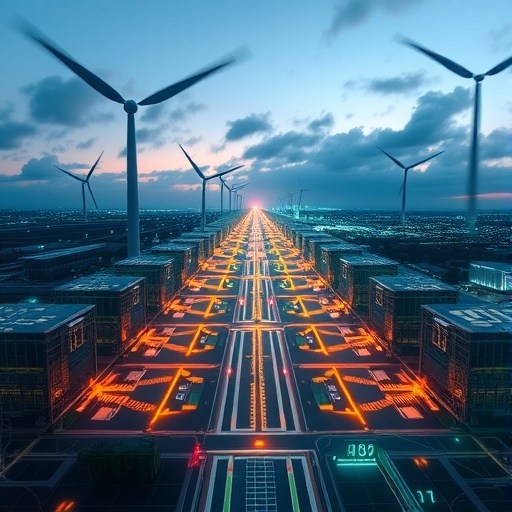In an era where energy systems are rapidly evolving, a pioneering initiative known as the “Understanding large and cOmplex Power sYstems” (UTOPYS) consortium is set to transform how scientists study and design tomorrow’s electricity networks. Spearheaded by Professor Peter Palensky of TU Delft, this consortium unites eight leading Dutch research institutions along with SURF, the Netherlands’ premier IT cooperative for education and research. Backed by a remarkable grant of 16.5 million euros from the Dutch Research Council’s Large-Scale Research Infrastructure (LSRI) program, UTOPYS positions itself as the world’s most ambitious and advanced platform for real-time energy system exploration and innovation.
At the heart of the UTOPYS endeavor lies a revolutionary research infrastructure designed to dynamically replicate the multifaceted behaviors of modern power systems. This digital twin capability will surpass existing models by enabling researchers not only to simulate but also to scrutinize energy networks of unprecedented scope and complexity well before their physical deployment. Such a system promises to unravel the elusive cyber-physical interactions and emergent phenomena that characterize future grids, delivering insights vital for their robustness, efficiency, and adaptability.
The substantial grant awarded to UTOPYS signals a pivotal moment in global energy research. Professor Palensky remarks that this financial boost is instrumental in addressing the critical safety and resilience challenges that energy systems face today. Securing Europe’s energy future, where networks are densely interconnected and technologically advanced, demands comprehensive modeling tools that faithfully represent the rapid interplay between physical power flow and digital controls.
What distinguishes UTOPYS is its unparalleled ability to model intricate cyber-physical dynamics within extensive energy infrastructures. Researchers will delve into phenomena such as hidden oscillation modes, the nuanced interactions among multitudinous control systems, and collective node behaviors reminiscent of swarm intelligence. Moreover, as digitalization injects increasing cyber vulnerabilities into power grids, the platform will allow proactive investigations of threats ranging from cyberattacks to sabotage, ensuring preparedness for a wide spectrum of adversities.
The necessity of such an advanced infrastructure is undeniable as energy systems worldwide face a confluence of transformative pressures. Electrification of transport, heating, and industrial processes is stretching network capabilities to new limits, fostering congestion while expanding system complexity. Concurrently, decentralized renewable generation, exemplified by solar photovoltaics and distributed storage, is reshaping power flows and control paradigms. Traditional assumptions dating back over a century—when centralized, synchronous generators dominated—are no longer adequate; contemporary grids bristle with power electronics and intelligent digital assets whose dynamic interactions demand far more nuanced approaches.
Contributing to the societal dimension, researchers like Koen Kok from TU Eindhoven emphasize that fairness and equitable electricity distribution remain paramount alongside technological resilience. The emerging grid must navigate uncertain futures shaped not only by variable weather but also by intentional disruptions and evolving regulatory landscapes. The UTOPYS framework will investigate alternative topologies, innovative control schemes, and market mechanisms within this multifaceted environment, armed with the most powerful digital twin ever constructed for energy research.
TU Delft and its partners already carry a strong legacy in developing smaller-scale digital twins, but UTOPYS stands apart by enabling macro-level simulations encompassing entire nations. This scalability opens new frontiers, allowing exploration of hypothetical technologies and system configurations yet to be realized, fostering experimental freedom that can guide policy and investment decisions. The consortium’s interdisciplinary nature—integrating power systems engineering, computer science, applied mathematics, energy economics, and legal expertise—supports a holistic approach to complex systemic challenges.
Beyond technical modeling, UTOPYS embraces an open science ethos, pledging to disseminate models and datasets as open source. This transparency invites collaboration across sectors, accelerates knowledge exchange, and nurtures innovation in government, industry, and academia alike. It also cultivates public engagement by demystifying the intricacies of energy systems, empowering both experts and non-specialists to participate in shaping sustainable energy futures.
The project exemplifies the Netherlands’ leadership within European energy research, bolstering a trajectory of scientific excellence. Over the coming decade, UTOPYS is expected to catalyze breakthroughs in understanding and managing the multifarious challenges posed by complex, stochastic, multiscale systems. Importantly, methodologies developed here will have cross-cutting relevance, extending their applicability to interconnected urban infrastructures such as water management, transportation networks, and climate resilience systems.
UTOPYS’s unprecedented scale and ambitions have earned it the top ranking within the fiercely competitive NWO LSRI programme, a testament to the consortium’s vision and collaborative strength. The strategic LSRI program seeks to ensure that Dutch research infrastructures remain at the forefront of scientific capability, ushering in innovation that reverberates across academic and societal domains.
In partnership with SURF, the consortium leverages cutting-edge IT services to support real-time experimental setups, extensive data analysis, and advanced computational techniques. The coordinated efforts span leading Dutch institutions including TU Delft, TU Eindhoven, the University of Twente, CWI, University of Groningen, Utrecht University, Erasmus University Rotterdam, and Radboud University, covering diverse disciplinary perspectives essential for tackling the labyrinthine aspects of future power systems.
UTOPYS is not only a research initiative but a landmark achievement signaling a paradigm shift in how energy systems will be conceived, tested, and optimized. The journey to build a resilient, secure, and equitable energy future necessitates tools that can reflect the complex reality of 21st-century infrastructures. By delivering the world’s largest dynamic digital twin infrastructure, UTOPYS empowers the scientific community to navigate uncertainties and innovate boldly, safeguarding energy security for Europe and beyond.
Subject of Research: Large-scale, real-time digital twin infrastructure for complex energy systems, encompassing modeling, control, optimization, cyber-physical dynamics, and resilience.
Article Title: Revolutionary Digital Twin Infrastructure UTOPYS Set to Transform Future Energy System Research
News Publication Date: Not specified in the source content
Web References:
https://www.nwo.nl/en/news/national-roadmap-nwo-invests-197-million-euro-in-eleven-large-scale-research-infrastructures
Keywords: Electricity, Energy Systems, Digital Twin, Cyber-Physical Systems, Power Grid Resilience, Renewable Integration, Energy System Modeling, Cybersecurity, Energy Transition, Smart Grids, Interdisciplinary Research, Large-Scale Infrastructure




